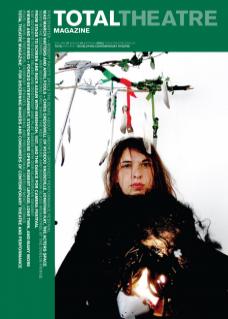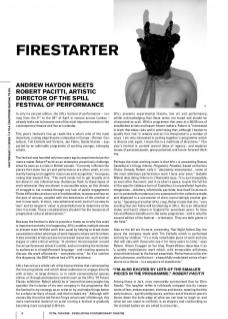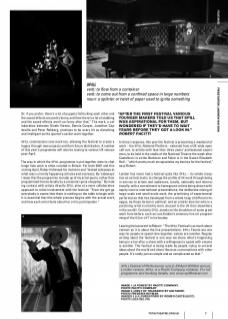In only its second edition, the SPILL festival of performance – running from the 2nd to the 26th of April in venues across London – already looks set to become one of the most important events in the contemporary theatre and live art calendar.
This year’s festival’s line-up reads like a who’s who of the most important, cutting edge theatre companies in Europe – Romeo Castellucci, Tim Etchells and Victoria, Jan Fabre, Gisele Vienne – supported by an admirable programme of exciting younger, emerging artists.
The festival was founded only two years ago by experimental performance maker Robert Pacitti as an attempt to proactively challenge what he sees as a crisis in British venues: “Currently in Britain the places that show live art and performance are often small, or constantly having to struggle for resources and recognition,” he argues, noting that beyond this, “The work tends not to get broadly writ- ten about in any informed way. Audiences flock to these types of work whenever they are shown in accessible ways, so this climate of struggle is not created through any lack of public engagement. These difficulties are born out of traditionalism, laziness and fear on the part of venues, coupled with the dominance of the artefact or text in new work. In short, new ephemeral work just isn’t so easy to ‘own’ and its long-term ‘value’ is potentially hard to determine at the time it is made. These considerations shouldn’t be the measures of progressive cultural advancement.”
Because the festival is able to provide a frame as to why this work is important and why it is happening, SPILL enables multiple venues to present more leftfield work than usual by helping to break down assumptions about what type of work happens where and for whom. It also provides artists access to increased resources, such as main stages or solid critical writing: “A common misconception around live art performance is that it’s elitist, and so in making the invitation to audiences in straightforward language – and creating spaces to discuss the work afterwards – everybody wins.” As if to confirm this diagnosis, the 2007 festival had a 91% attendance.
SPILL has set up a whole raft of festival activities that contextualise the live programme and which allow audiences to engage directly with artists: at large dinners, or in small conversational spaces, online, or through participatory events such as the SPILL ‘07 Future Classic exhibition. Robert admits he is “aware that some people may question the inclusion of my own company in the programme. But the festival is my strategy as an artist to try and make things better for a whole territory of work, and that includes me.” Although with venues like the artist-led Forest Fringe at last year’s Edinburgh, this more continental model of an artist running a festival is gradually becoming more accepted in Britain.
SPILL presents experimental theatre, live art and performance, whilst acknowledging that these terms are broad and should be interpreted as such. With a programme that aims at a 50/50 mix of established artists and lesser-known makers, Robert is “interested in work that takes risks and in prioritising that, although I hasten to qualify that ‘risk’ is relative and so it is interpreted in a number of ways. I am only interested in putting together a programme which is diverse and, again, I mean this in a multitude of directions.” This year’s festival is curated around ideas of ‘agency’, and explores issues of personal power, group potential, and future-forward thinking.
Perhaps the most exciting news is that SPILL is presenting Romeo Castellucci’s trilogy Inferno, Purgatorio, Paradiso, based on Dante’s Divine Comedy. Robert calls it “absolutely monumental... some of the most ambitious performance work I have ever seen.” Isabelle Metral describing Inferno in L’Humanité says, “It is just impossible, so soon after the event, and in so short a space, to give the full list of the specific tableaux born of Castellucci’s unparalleled hypnotic imagination... Adultery, infanticide, parricide, love itself (in as much as it is potentially murderous) are summoned in the collective mode, and displayed in a succession of slow, excruciatingly precise ges- tures.” Speaking of another SPILL coup, Robert notes that it is, “very exciting that Jan Fabre will be showing in SPILL. He is an influential maker and hasn’t shown in England for seventeen years. To have him and Romeo Castellucci in the same programme – and in only the second edition of the festival – is fantastic. They are both giants in the field.”
Also on the bill are Victoria, presenting That Night Follow Day, the piece the company made with Tim Etchells which is performed entirely by children: “it’s a truly remarkable piece of work and one that will stay with those who see it for many years to come,” says Robert. Alison Croggan on her blog TheatreNotes describes it as “a quietly revolutionary work which, with immaculate artfulness, strips theatre back to the barest essentials. Performance is the simplest utterance, and the text – a beautifully modulated series of variations on a theme – is a sequence of statements.”
Among these is Jerk, once memorably summarised thus by Chris Goode: “the laughter reflex is ruthlessly unzipped into its components of fear, embarrassment, distress and desire, meaning that the early humour... quickly deliquesces, and the rest of the short piece’s dance down the knife-edge of what we can bear to laugh at, and what we can stand to confront, is as slippery and confounding as the violated bodies we are asked to encounter...
Or, if you prefer: there’s a lot of puppets fistfucking each other and the sound effects are pretty funny, and then there’s a lot of stabbing and the sound effects aren’t so funny after that.” The work, a col-laboration between Gisele Vienne, Dennis Cooper, Jonathan Capdeville and Peter Rehberg, promises to be every bit as disturbing and intelligent as the quartet’s earlier work together.
SPILL commissions new work too, allowing the festival to create a legacy through new projects and their future distribution. A number of this year’s programme will also be touring to various UK venues post-April.
The way in which the SPILL programme is put together aims to challenge how work is often curated in Britain. For both 2007 and this coming April, Robert followed his instincts and “looked sideways at what was currently happening at home and overseas. By ‘sideways’ I mean that the programme is made up of my artist peers, rather than programmed hierarchically by a presenter gone shopping.” By making contact with artists directly SPILL aims at a more collaborative approach to artist involvement with the festival: “From the get-go everybody is aware that there is nothing on the table to begin with. It is essential that this whole process begins with the actual work, and how each artist feels about her or his participation.”
In direct response, this year the festival is presenting a weekend of work – the SPILL National Platform - selected from a UK-wide open call-out, to artists with less than three years’ professional experience, to be held in the studio of the National Theatre the week after Castellucci is at the Barbican and Fabre is in the Queen Elizabeth Hall – “which pretty much encapsulates my desires for the festival,” says Robert.
London has never had a festival quite like SPILL – its whole inception an activist tactic to change the profile of UK work through being in service to artists and audiences, locally, nationally and internationally; with a commitment to homegrown artists being shown with equity next to international presentations; the deliberate mixing of large-scale and small-scale work; the prioritising of experimental performance that has developed from a whole heap of different lineages, be those formal or political; and an artistic director who is a practising artist (certainly more unusual in the UK than elsewhere in the world). Certainly SPILL stands on the shoulders of some great work from before, such as Lois Keidan’s visionary live art program- ming of the ICA or LIFT in its heyday.
Leaving the last word to Robert: “The SPILL Festival is as much about context as it is about the live presentations: SPILL Feasts are one way for people to spend time together, salons are another. Regular writing about the festival is one way we share what’s happening, being in a bar after a show with a willingness to speak with anyone is another. The festival is being made by people trying to unravel ideas about the world and share these as conversations with other people. It’s really just as simple and as complicated as that.”
SPILL Festival of Performance runs 2–26 April 2009 at various London venues. SPILL is a Pacitti Company initiative. For full programme and booking details, see www.spillfestival.com


